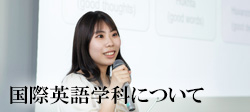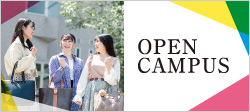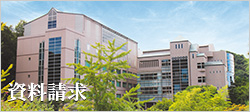【KEG class profile】Language Diversity & Society
2023.09.04 授業紹介
In the Language Diversity & Society class, third-year Global Studies in English (GSE) students get together to look at how society impacts on language use. We look at how important factors such as age and gender affect language use. We also look at the fascinating effects that regional differences have on the way language is used and at how different people show politeness through language in different ways.
(国際英語学科GSEコースの"Langugae Diversity & Society"という3年次科目をご紹介します。この授業では、社会がどのように人々が話すことばに影響を与いるかを考えます。例えば、年齢、ジェンダー、地域、丁寧さなどの違いを取り上げます。)
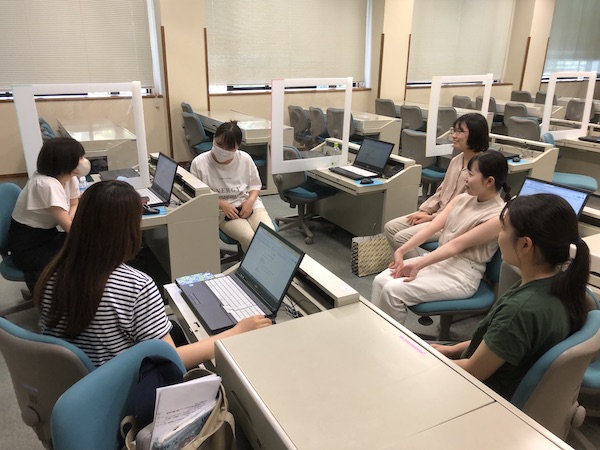
A typical discussion session in the Language Diversity & Society class
This is a very active and collaborative class. We make use of the small class size to ensure that each student has a voice. Our usual pattern of studying a particular topic is to first have a discussion about a variety of themes within the topic. This acts as a kind of brainstorming session. MK told us that "discussion with classmates and the teacher" was her favorite part of the course. Students write short notes to help in preparation for the discussion, such as those shown below.
(少人数制の授業を活かして、どの学生も発言できる環境で活発にそして互いに協力して授業での活動を行います。まずは、一つのトピックに関する様々な点について、ブレインストーミングを兼ねてディスカッションを行います。受講生の1人MKさんは、こうした学生と教員がディスカッションを行う点が授業の好きな点だと言います。議論の準備として、次のようなメモを学生は準備します。)
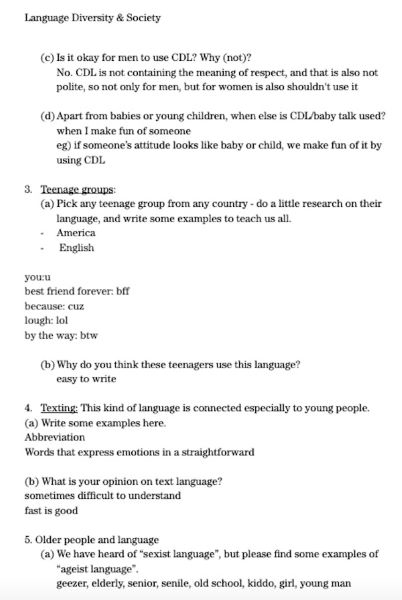
A student's notes in preparation for discussion on the theme of "language and age"
Students need to come up with their own ideas, explain their own experiences and discover what they would like to find out more about. TK said, "I really enjoyed the contents of this class, and I learned a lot. Through this course, I want to learn more about my hometown dialect from how my grandparents speak". AM told us that she particularly "enjoyed comparing and analysing the relationships between language and the theme" and that for her, the "most impressive theme was language and gender". RY enjoyed studying about the effects age had on language use. She explained that this was because she has little "opportunity to speak with other generations, so it was a great opportunity to understand other language used by different generations".
(学生たちは、これまでの経験を踏まえて自分のアイデアを説明し、さらに掘り下げたい点を見出します。この授業を受けた学生の感想を紹介します。TKさんは、「授業の内容は興味深く、多くのことを学びました。祖父母が話す地元の方言についてもっと学びたいという気持ちになった」というこです。AMさんが特に興味を持ったのは、ことばとジェンダーの関係だということです。また、年代が与える影響について興味を持ったRYさんは、その理由として、普段他の世代の人と話す機会が少ないため、世代ごとのことばの違いについて知れたことが大きな学びになったということです。)
Next we have some teacher input through slides, video clips and other teaching materials. This allows the students to get deeper insight into the theory and gain greater understanding through illustrative examples.
(ディスカッションの次は、文字や映像の資料を使って教員が説明を行い、専門的な知識と理解を深めます。)
Finally, students do mini-research tasks on the theme before making presentations to the class. MS told us conducting this research was worthwhile, explaining that "having a questionnaire was enjoyable because I liked seeing many of my friends and family's opinions".
(最後に、学生たちがそのトピックについてミニリサーチを行い、発表します。MSさんはアンケートをとり、友人や家族の意見を知ることができた点に意義を見出していました。)
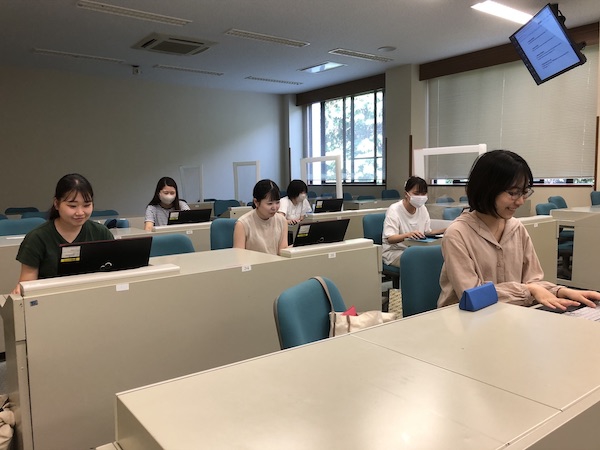
Background work being conducted by students as part of one of their research tasks
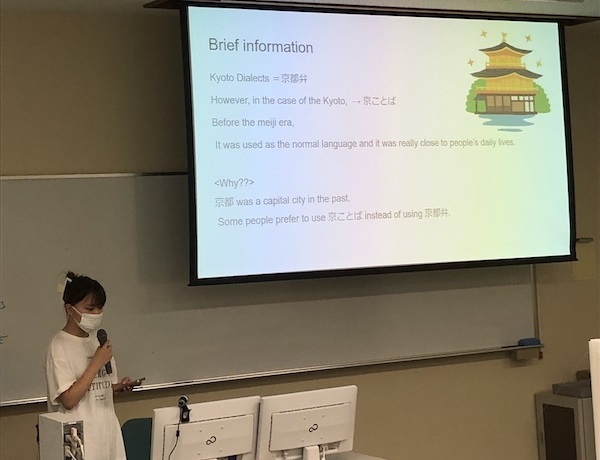
AM makes a presentation about dialect use in Kyoto
The class involves discussion, research, initiative and collaboration for presentations. We had a really enjoyable class in the first semester of 2023, and it all took place through the medium of English. We hope you will enoy this class in the future, too.
("Language Diversity & Society"では、授業をすべて英語で行い、プレゼンテーションに向けて、ディスカッションとリサーチを行い、自発的に協力して学習します。これからも、たくさんの学生にこの授業で多くを学んでもらいたいと思います。)





